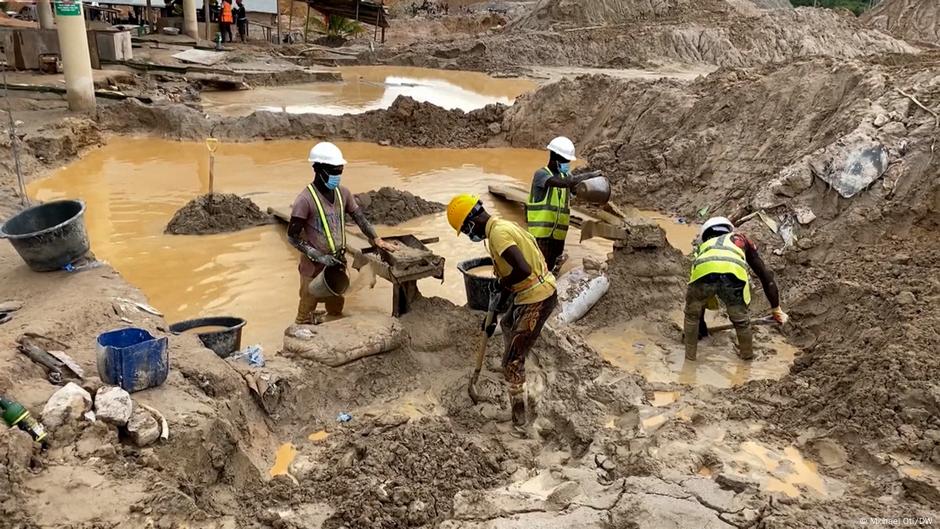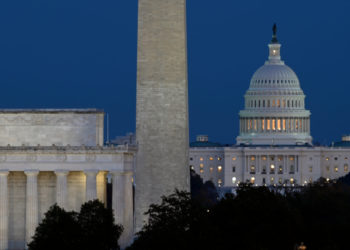The medieval times, the name meant ruler of the Ghana Empire, or “King of Gold.” The country’s colonial-era name, Gold Coast, also symbolized the importance the metal in the country and region.
But how gold is mined today, and who it is mined for, has become contentious. and climate change have partly led to an explosion of galamsey, a byword for illegal artisanal mining. It is estimated to employ a million Ghanaians. and a host of environmental, agriculture and health problems has ensued.
“In Ghana, we face what I call an existential threat. Our own survival is being challenged by the poisoning of our water bodies, the destruction of our forest reserves and farmlands. Our water is not safe. Our food is not safe,” says Awula Serwaa, co-founder of Eco-Conscious Citizens, which is against galamsey.
While the practice used to revolve around abandoned artisanal mining now involves sophisticated earth moving equipment.
“We’ve had so many people, children, even adults, falling into open pits left by irresponsible miners and drowning and dying,” Serwaa says.
Ghana’s cocoa industry has suffered, even though Ghana is the second biggest exporter of cocoa beans after neighboring Ghana maintains price controls on the crop to support farmers – in fact it raised the price per tonne of cocoa by more than 60% in dollar terms in mid-2025. But it has not been enough to stop some farmers from joining the gold rush, selling off land to informal miners.
“Climate change means that in many of these regions, including northern Ghana, agricultural yields are diminishing,” says Lucia Bird of the Global Initiative Against Transnational Organized Crime (GI-TOC), which recently released a report detailing the impact of the illicit gold trade in West Africa.
Gold sector vulnerable to infiltration
The GI-TOC research shows a new dimension emerging: the tri-border area between Ghana, Ivory Coast and is a growing resourcing hub for Jama’at Nasr al-Islam wal-Muslimin (JNIM), an affiliate. Fuel, motorbikes and other goods are trafficked from Ghana’s ports to the Sahel, with Ghanaian border towns hosting markets where cattle stolen in Sahelian conflict regions are sold.
JNIM appears to have “drawn resources” artisanal gold mining in the tri-border area, and the sector remains vulnerable. In these gold mines can employ over 1,000 miners. The report suggests armed groups “more often derive revenue through taxation of mining activities, sometimes in return for providing security, or at the very least not attacking the mining community themselves.”
“Because of the structure of the gold mining economy – artisanal gold flows north, financing coming south – it all makes it vulnerable to infiltration by JNIM,” Bird told DW. “We have not found any conclusive evidence that JNIM is drawing finance from northern Ghana’s gold sector.”
Bird explained that “pre-financing”, where capital to fronted to start mining operations, is often sourced far from the mining areas: “We know from our research that quite a lot of the gold buyers in that band in northern Ghana have pre-financing from Burkinabe larger scale buyers.”
According to Solomon Kusi Ampofo, who specializes in natural resource governance, mining without a license in Ghana is largely illegal.
“In Ghana, you cannot mine without the consent of people who have interests in that land,” he told DW. “And, if you’re able to address and prosecute people who give out land freely or willingly for people to engage in illegal operations, we can address the problem.”
Illegal mining affects legal operations, government revenues, and the environment.
“Small scale gold miners are supposed to pay 5% royalties on gross gold production, which they are not paying. At a point of export, the miners are supposed to pay 1.5% of the value of the gold that is being exported,” Ampofo said. “In terms of revenue, government is getting very little from the small scale mining sector, but the environmental footprints are glaring.”
‘Stabilizing effect’
The GI-TOC research suggests gold mining can have a stabilizing effect. Fighters take up gold mining instead of directly participating in cattle rustling or kidnapping for extortion. That said, some gold mining areas have become hubs for illicit activities such as drugs and arms trafficking.
Ghana has attempted to control artisanal gold mining, which is seen to bring benefits to communities, without alienating communities.
DW interviewed gold miners in the Talensi District of Ghana’s Upper East Region, which borders Burkina Faso. Mounds of brown earth litter the landscape, with water-filled craters interrupted by metal panning bowls and hand shovels.
“There is so much unemployment in the constituency, in the district and in the community,” Richard Kplemisor, one of the miners, said.
His colleague, Joseph Mbasakiya, said: “Majority of my friends, they’ve left. But I don’t want to be suffering in someone else’s community. I can find gold here.”
An older man, Michael Asaah Seidu, spoke of the frustrations his community faces in attaining mining permissions legally.
“The process is so tedious. We have some of our elder brothers in the Talensi District who have legal licenses, but currently they are expired and they have gone to all the appropriate authorities, agents, ministry to renew it, and they don’t want to renew it for them,” he told DW.
Concessions have instead been given to a Chinese mining company, according to Seidu. “The Chinese people don’t even employ people from the Talensi. They employ people from the south. We can’t sit idly by – we have families and school fees to pay.”
He hopes the government will reduce the cost and bureaucracy around mining licenses for local people: “In that case, I think destroying the environment will be reduced.”
Government losing ground
While many gold miners hope to strike it rich while the commodity prices are high, or even just make enough to support their families, critics say Ghana’s government is losing ground quickly.
“I call them terrorists, because even in wartime, when you poison water, it’s a war crime,” Serwaa said. She believes there’s not enough “political will” to gain control of the artisanal mining boom, and that political authorities and law enforcement are “complicit.”
Ampofo said security forces need to be deployed to water bodies, which are particularly sensitive to illegal mining operations.
“Then we need to address licensing. You cannot give out a license to a miner when there is no proof of geological investigations, economic viability of the area, and their finances,” the natural resource governance expert told DW.
For Awula Serwaa, time is running out: “If the government chooses to act now, robustly and swiftly, we will deal with it. But if we wait too long, it will become even more difficult than it is.”
Edited by: Benita van Eyssen
The post How Ghana’s gold rush threatens to fuel illicit trade appeared first on Deutsche Welle.




